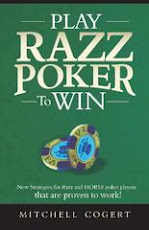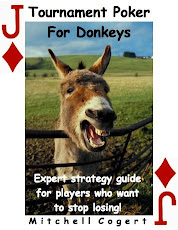 Image via WikipediaAn Interesting Hand of Poker: What would you do?
Image via WikipediaAn Interesting Hand of Poker: What would you do?I am playing in a $15-$30 live cash game of limit hold'em. It is a full table of 10 players.
In this hand, I am on the button with As-Ts.
Everyone folds to the player in the cutoff. This player is winning tonight and he has been super aggressive with many pre-flop raises.
As expected, he raises.
I already had decided that whenever he raises first in a pot in late position, I would re-raise him with a calling hand or better. My objective is to get heads-up on the flop.
I re-raise here.
The small blind is a selectively aggressive player. He has been having a losing session, though, and he may be a little on tilt after the last few pots he lost. He calls-which is a little surprising
The big blind is straight forward in his play. A little too conservative and predictable. It surprises me when he calls as well.
The Flop
The pot is $180.
The flop is Ad-7h-6h.
The player in the small blind bets out. The big blind calls. The cutoff folds.
I raise..Why? I think I am ahead, and this raise will help me to find out more on where I stand in this pot.
Well, to my surprise the small blind re-raises and the big blind caps it!
What the heck is going on here?
Would you call two bets with your hand here?
I take some time to think this over. I put the big blind on a flush draw since he didn't raise the first time the small blind bet. I put the small blind on top pair. The question is does he have me out-kicked?
Well, I take some more time to think about the small blind. If he had A-K or A-Q, he would have re-raised me pre-flop. That means that he either has A-J, A-T or worse. I doubt he flopped two pair or a set.
I make the call.
Three of us take the turn.
The pot is now $360.
The Turn
The turn is a 6c, pairing the board.
The small blind bets out and the big blind calls.
Okay, what should I do here?
What would you do?
I could raise--but I doubt I will slow down the small blind or get anyone to fold given the pot size. And, I won't necessarily get a free card either.
The pot is too big now, but I really don't want to see a river bet from my opponents. How can I get the small blind to stop from betting on the river?
I say out-loud ..."I'm either way ahead or way behind."
I figure that if the big blind misses his draw, there is no way that the small blind will bet as he has to believe that I may have A-K or A-Q now.
I call.
The pot is now $450.
The River and the Results
The river is a 2s.
My opponents check...should I bet here?
Well, given what I said on the turn, I check.
The small blind shows A-8. The big blind mucks.
I win with my A-T!
What a hand...it seems so clear now.














